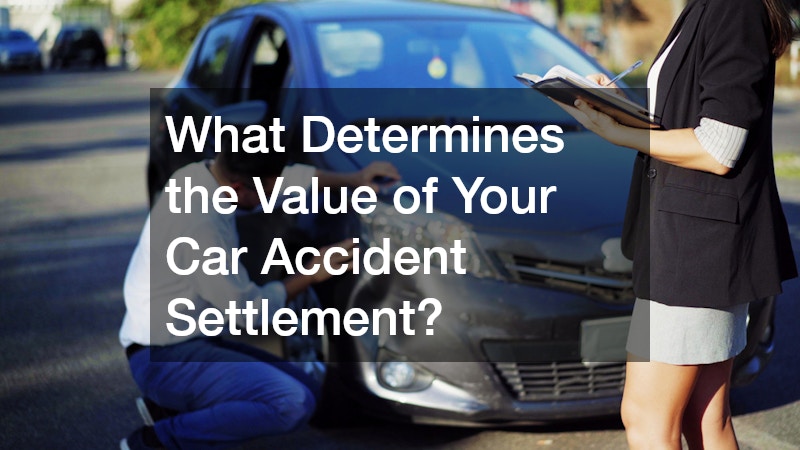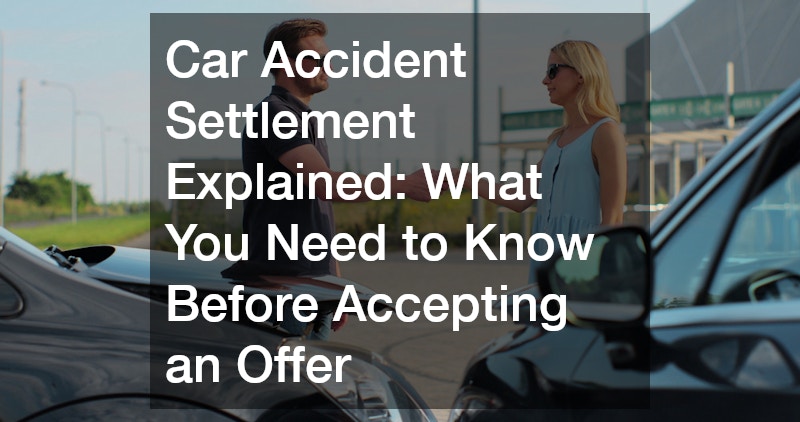If you’ve recently been in a car accident, the aftermath can feel overwhelming. Between dealing with insurance companies, medical appointments, car repairs, and lost income, you may be eager to accept a quick settlement offer just to move on. But here’s the truth: accepting a car accident settlement too soon can cost you thousands of dollars—or more—in unpaid damages and ongoing losses.
This comprehensive guide walks you through everything you need to know before accepting a car accident settlement offer. From how settlements are calculated to understanding your legal rights, tax implications, and more, this article aims to empower victims with the information they need to make the smartest financial and legal decisions after a crash.
What is a Car Accident Settlement?
A car accident settlement is a financial agreement between a claimant (you) and the at-fault party’s insurance company or legal representation. Instead of going to trial, both parties agree on an amount that compensates you for injuries, property damage, lost income, and other losses resulting from the crash.
Settlements are typically paid in one lump sum and may cover:
- Medical bills (past and future)
- Vehicle repairs or replacement
- Lost wages
- Pain and suffering
- Legal expenses
Most car accident cases are resolved through settlements because they’re faster, less costly, and less risky than court trials. However, not all offers are fair, and insurance companies often offer low initial settlements in hopes you’ll accept without negotiating.
How Long Does a Car Accident Settlement Take?
The timeline of a car accident settlement varies depending on the complexity of the case. On average, a settlement can take anywhere from a few weeks to several months—or even years—to resolve.
Factors that influence the timeline include:
- Severity of injuries: More serious injuries require more time for medical evaluation.
- Liability disputes: If fault is contested, resolution takes longer.
- Negotiations: A low initial offer may lead to several rounds of negotiation.
- Legal involvement: Hiring a personal injury attorney may add time, but often results in a better settlement.
Typical timeline breakdown:
- 1–2 weeks: Initial claim filed and insurance investigation begins.
- 3–6 weeks: Medical evaluation and repair estimates are submitted.
- 1–3 months: Negotiations begin.
- 3–12 months: Settlement reached or legal action initiated.
What Determines the Value of Your Car Accident Settlement?

No two settlements are alike. The amount you’re entitled to depends on various economic and non-economic damages. Insurers and attorneys calculate settlements based on:
1. Medical Expenses
- Emergency care
- Hospital stays
- Ongoing treatment
- Future medical care
2. Lost Wages and Earning Capacity
- Days missed from work
- Lost future earning potential if injuries are permanent
3. Property Damage
- Vehicle repairs or replacement value
- Towing and rental car costs
4. Pain and Suffering
- Physical pain
- Emotional trauma
- Reduced quality of life
5. Fault and Liability
Your level of responsibility in the accident can directly impact your settlement. In many states that follow comparative negligence rules, your compensation may be adjusted based on your share of fault. For instance, if you’re found to be 20% responsible for the accident, your total settlement amount could be reduced by that same percentage.
Common Mistakes That Could Hurt Your Car Accident Settlement
Don’t sabotage your own claim by making these avoidable mistakes:
- Accepting the first offer too quickly
- Failing to get full medical documentation
- Posting about the accident on social media
- Delaying medical treatment
- Not consulting a personal injury lawyer
Always take time to assess your losses and speak to a legal expert before signing anything.
Should You Accept the First Settlement Offer?
The short answer? Probably not. Insurance companies are incentivized to minimize payouts. Their initial offers often don’t fully cover medical bills, lost income, or emotional distress.
Before accepting:
- Consult a personal injury lawyer for a free evaluation.
- Calculate your actual damages with documentation.
- Negotiate or reject the offer if it’s unfair.
Car Accident Settlement vs. Trial: Which Pays More?
While settlements are faster and less stressful, trials may result in higher compensation, especially for catastrophic injuries or wrongful death cases. However, trials carry higher legal costs, longer timelines, and more uncertainty.
| Factor | Settlement | Trial |
| Time | Weeks to months | Months to years |
| Cost | Lower | Higher (legal fees, court costs) |
| Risk | Lower | Higher (jury unpredictability) |
| Payout | Usually lower | Can be significantly higher |
Tip: A lawyer can help evaluate whether your case is strong enough to go to trial.
How Much Is the Average Car Accident Settlement?
The average car accident settlement ranges between $15,000 and $75,000, but payouts can vary drastically based on the severity of the accident. Here’s a rough estimate:
- Minor injuries: $3,000–$15,000
- Moderate injuries: $15,000–$50,000
- Severe injuries or permanent disability: $75,000–$500,000+
- Wrongful death: Often $500,000–$1,000,000+
Location also matters—settlements in urban areas or states with higher medical costs tend to be higher.
Car Accident Settlement for Minor Injuries: Is It Worth It?
Yes, even minor injuries can have long-term implications. A soft tissue injury, like whiplash, might seem insignificant at first, but worsen over time. Don’t dismiss minor injuries without:
- Medical examination and follow-up
- Legal advice
- Accurate documentation of pain and treatment
Settlements for minor injuries typically cover medical costs and a small amount for pain and suffering.
Who Pays in a Car Accident Settlement?
In most cases, the at-fault driver’s insurance company pays the settlement. But there are exceptions:
- Uninsured drivers: Your own uninsured motorist (UM) coverage may apply.
- Underinsured drivers: Your underinsured motorist (UIM) coverage helps cover the gap.
- Multiple drivers involved: Liability is shared based on fault percentages.
Check your insurance policy to see what’s covered and if supplemental claims apply.
Dealing With Uninsured or Underinsured Drivers
Getting into an accident with someone who doesn’t carry sufficient insurance is frustrating, but you still have options:
- Use your UM/UIM coverage: Often included in full-coverage policies.
- File a personal lawsuit: Not always fruitful if the driver has few assets.
- Check for third-party liability: For example, if the driver was using a company vehicle.
What Happens If a Child Is Injured in a Car Accident?
Settlements involving minors require court approval to ensure the child’s best interests are protected. Funds are often placed in a trust or structured settlement until the child reaches adulthood.
Damages typically cover:
- Medical treatment
- Long-term care needs
- Emotional trauma
- Future lost earnings (if applicable)
Legal representation is strongly recommended in these cases.
Car Accident Settlement After a Hit-and-Run: What Are Your Options?
If the at-fault driver fled the scene:
- File a police report immediately
- Use your UM coverage for bodily injuries
- Use collision coverage for vehicle damage
- Check for surveillance footage or witnesses
You may still receive a fair settlement from your insurer, even if the driver is never found.
Medical Bills and Lost Wages: What’s Covered?
Your settlement should cover all current and reasonably projected future medical expenses, including:
- ER visits
- Hospital stays
- Physical therapy
- Prescription medications
- Surgery
For lost wages, include:
- Documentation from your employer
- Pay stubs or tax returns
- Doctor’s notes confirming your inability to work
Don’t forget to include potential future earnings if your injury affects long-term employability.
Taxable or Not? What to Know About Taxes on Car Accident Settlements
In general, car accident settlements are not taxable if they compensate for physical injuries or illness. According to the IRS:
- Non-taxable: Medical expenses, pain, and suffering related to injury
- Taxable: Lost wages, interest on the settlement, and emotional distress without physical injury
Always consult a tax advisor when you receive a settlement to understand your obligations.
How to Negotiate a Better Car Accident Settlement

Negotiating with insurance companies isn’t easy—they have trained adjusters whose goal is to settle for the lowest amount possible. That’s why knowing how to negotiate effectively can significantly increase your compensation. If the initial offer doesn’t reflect your actual losses, don’t hesitate to push back.
Steps to negotiate successfully:
- Gather complete documentation: Include medical bills, repair estimates, proof of income loss, and police reports.
- Know your claim’s value: Research typical settlements for similar injuries in your area.
- Send a demand letter: Detail your losses and request a specific settlement amount.
- Stay calm and professional: Avoid emotional arguments; stick to facts and evidence.
- Be prepared to walk away: If negotiations stall, your attorney can initiate legal action.
Working with a personal injury lawyer can help you counter unfair tactics and ensure you receive a settlement that reflects your true damages.
When to Involve a Personal Injury Attorney
While some straightforward claims can be handled independently, complex or high-value cases benefit greatly from legal representation. An experienced personal injury attorney can increase your settlement value, handle negotiations, and protect you from bad-faith tactics by insurers.
Hire a lawyer if:
- You suffered serious or permanent injuries
- Fault is disputed or unclear
- You’re being blamed for the accident
- The insurer is delaying or denying your claim
- You’re unsure what your case is worth
Most personal injury lawyers operate on a contingency fee arrangement, which means you won’t owe them anything unless they successfully recover compensation for you. This setup not only reduces your upfront financial risk but also increases your chances of securing a fair settlement, making legal representation a smart move for many accident victims.
What to Do After a Settlement Is Reached
Once you’ve accepted a settlement, the process isn’t over just yet. There are important steps to take to ensure everything is finalized correctly and that you protect your financial interests.
After agreeing to a settlement:
- Review all documents carefully before signing a release of liability.
- Track the timeline: Most insurers process payment within 30 days of the signed agreement.
- Pay outstanding medical bills or liens (if applicable).
- Consult a tax advisor to understand any tax implications.
- Keep a copy of all documents for your records, including medical and legal paperwork.
Once the release is signed and payment is made, your case is closed—you won’t be able to reopen it later. That’s why it’s crucial to ensure the settlement covers all current and future costs related to the accident.
Top Tips to Maximize Your Car Accident Settlement Payout
To get the best outcome possible, follow these tips:
✅ Seek immediate medical attention
✅ Document everything (photos, police reports, witness statements)
✅ Keep a daily injury journal
✅ Don’t give a recorded statement without legal counsel
✅ Consult a personal injury attorney early in the process
✅ Don’t settle until you’ve reached maximum medical improvement (MMI)
Final Thoughts: Don’t Accept a Settlement Until You’re Informed
A car accident can turn your life upside down. And while a settlement may feel like a relief, it’s crucial to ensure that the offer fully covers your present and future needs. Once you accept, you usually can’t go back and ask for more.
By understanding the settlement process, the value of your claim, and your legal rights, you’re in a better position to make a decision that truly serves your recovery and long-term well-being.
